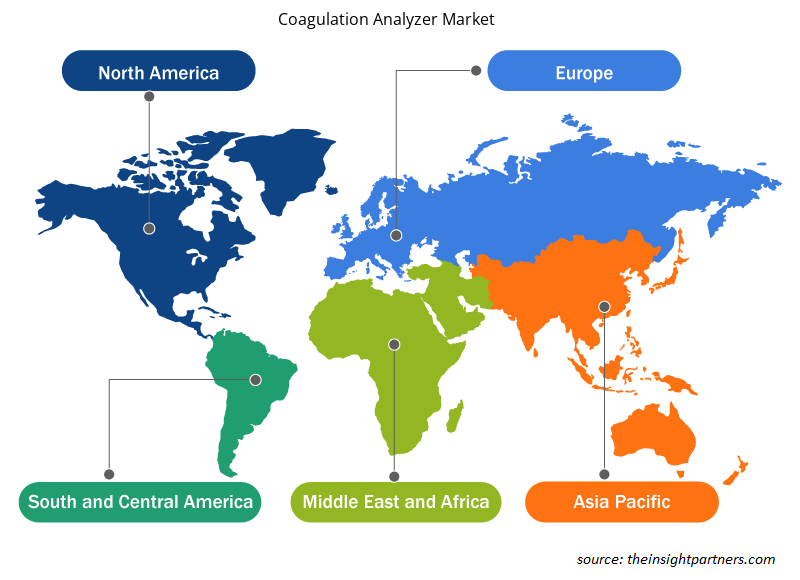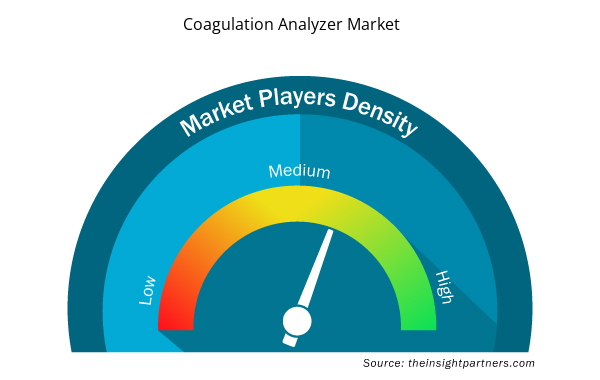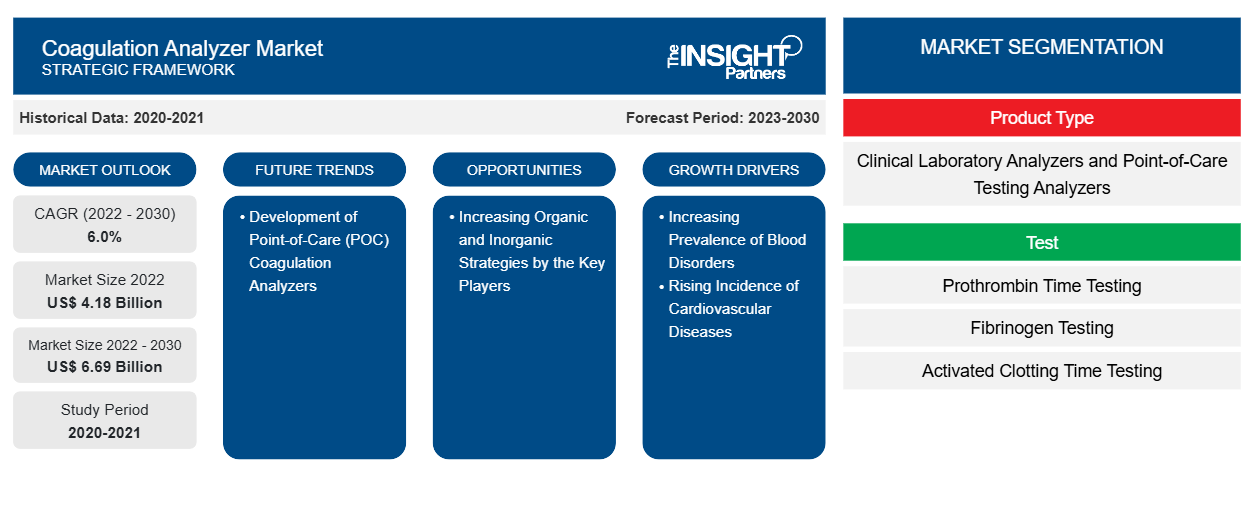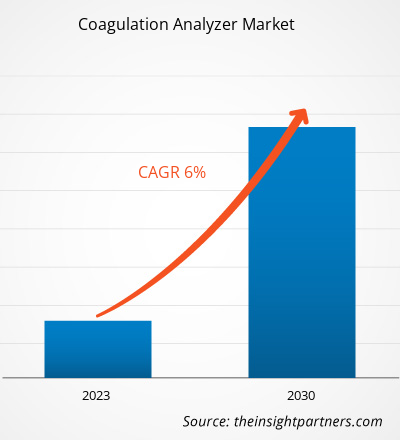[研究报告] 凝血分析仪市场规模预计将从 2022 年的 41.8371 亿美元增长到 2030 年的 66.9008 亿美元;预计 2022 年至 2030 年的复合年增长率为 6.0%。
分析师观点
凝血分析仪市场分析包括驱动因素,例如人口中血液疾病患病率上升和心血管疾病发病率上升。此外,即时检测凝血分析仪是 2022-2030 年市场增长的未来趋势。根据报告中基于产品类型细分的细分情况,临床实验室分析仪细分市场在 2020 年占据最大份额。就测试类型而言,2D 凝血酶原时间测试细分市场占据最大份额,占据市场主导地位。按技术划分,光学技术细分市场将在预测期内占据凝血分析仪市场增长的相当大份额。根据应用,预计临床实验室细分市场将在 2022-2030 年期间占据凝血分析仪市场增长的最大份额。
凝血分析仪可以快速、简单地测量血小板水平。凝血分析仪用于测量凝血途径速度,在短短几分钟内检查凝血素和凝血活酶水平。此外,几家顶级公司正在制造用于止血测试的创新凝血分析仪。Sysmex CS-2500 系统就是这样一个例子,它采用了智能设计的技术,包括使用 PSI 技术的基于分析的分析前样品质量检查、自动混合研究、自动血小板聚集和凝块波形分析。这种自动化过程提高了效率、出色的准确性和可靠的首次运行结果。
定制此报告以满足您的需求
您可以免费定制任何报告,包括本报告的部分内容、国家级分析、Excel 数据包,以及为初创企业和大学提供优惠和折扣
- 获取此报告的关键市场趋势。这个免费样品将包括数据分析,从市场趋势到估计和预测。
市场洞察
血液疾病患病率上升
凝血分析仪是一种测量和评估血凝块形成或凝结速度的设备。它提供了一种快速、简单的方法来准确测量血小板水平以及凝血素和凝血活酶水平。根据国家罕见疾病组织的数据,血友病 A 是一种常见的 X 连锁隐性遗传疾病,是继血管性血友病之后第二常见的遗传性凝血因子缺乏症。在美国,大约每 5,000 名新生男性中就有 1 名患有血友病 A。根据美国国家医学图书馆 (NLM) 的数据,2020 年,美国约有 30,000-33,000 名男性患有血友病。根据美国卫生与公众服务部的数据,2020 年,约有 100,000 名美国人患有镰状细胞病 (SCD),这是最常见的遗传性血液疾病。此外,到 2050 年,预计患有 SCD 的人数将增长约 30%。根据美国国家医学图书馆的数据,到 2022 年,约 1% 的个体(未选择的人群)患有血管性血友病,即每 100 万人中有 125 人。同样,根据 2020 年 NLM 发表的研究,在欧盟,有 8000 万人患有血液疾病,从癌症到出血性疾病不等。根据美国国家罕见疾病组织的数据,到 2022 年,在美国,免疫性血小板减少症 (ITP)(一种自身免疫性出血性疾病)每年影响每 100 万人中约 66 名成年人。此外,在美国,成人 ITP 的发病率为每 100,000 人每年约 3.3 人,而患病率为每 100,000 人 9.5 人。因此,血液疾病患病率的上升正在推动凝血分析仪市场的增长。
即时诊断(POC)凝血分析仪的开发
对于有创伤或其他出血问题的患者来说,快速、可靠的止血评估至关重要。由于样品制备和分析过程的要求,常规凝血试验无法可视化凝块形成过程,并且其结果只能在 30-90 分钟后获得。可以使用即时诊断 (POC) 设备(例如粘弹性凝血测试、血小板功能测试、血气分析和其他凝血仪)来评估止血情况。POC 测量工具可在医院内外用作决策和管理工具。当时间至关重要时,POC 分析仪可在急诊室、冠心病监护室、手术室和手术室提供即时、可操作的结果。除了门诊诊所和医生办公室外,这些设备还可以协助药房、护理中心和患者家中的患者管理。POC 凝血分析仪提供及时的结果,而不会影响中央实验室提供的诊断质量控制。在 POC 测试中,提供快速结果以及准确性和质量保证非常重要。
2021 年,西门子医疗推出了全自动 CN-3000 和 CN-6000 系统,它们是中高容量手持式 POC 凝血检测设备。西门子医疗的 Xprecia Stride 凝血分析仪已获得 FDA 批准作为 POC 凝血分析仪设备。该设备已证明 PT/INR(即凝血酶原时间/国际标准化比率)测试性能与 Roche CoaguChek XS 相当。
因此,POC 凝血分析仪的不断发展可能会在预测期内推动市场增长。
报告细分和范围
基于产品类型的洞察
根据产品类型,凝血分析仪市场细分为临床实验室分析仪和即时检测 分析仪。临床实验室分析仪进一步分为系统和耗材。临床实验室分析仪部分在 2022 年占据了更大的市场份额。即时检测分析仪在凝血分析仪市场中占据了显著的复合年增长率。即时检测 (POC) 分析仪用于获取血液蛋白的结果。这些分析仪用于医生办公室、医院。即时检测分析仪可对多项医学测试提供快速反馈。
POCT 的好处
- 可移植性
- 方便
- 速度
- 连接
- 样品质量
- 质量保证
这些设备测量凝血的电化学、光学和机械参数。在各种激活剂的帮助下,用于凝血监测的 POC 测试在检测出血性疾病和监测抗凝药物方面发挥着重要作用。在这方面,微流体、荧光显微镜、电化学传感、光声检测和微/纳米机电系统等先进技术已被用于开发高精度、坚固耐用且经济高效的 POC 设备,例如 Roche Diagnostics CoaguChek XS System 和 ARKRAY, Inc. SPOTCHEM HS HS-7710。
基于测试类型的见解
根据测试类型,全球凝血分析仪市场分为凝血酶原时间测试、纤维蛋白原测试、D-二聚体测试、血小板功能测试、活化凝血时间测试、活化部分凝血活酶时间测试等。凝血酶原时间测试部分在 2022 年占据了最大的市场份额。D-二聚体测试部分预计在预测期内以最高复合年增长率增长。凝血酶原时间 (PT) 是一种用于帮助检测和诊断出血性疾病或过度凝血障碍的测试;国际标准化比率是根据 PT 结果计算得出的,用于监测血液稀释药物(抗凝剂)华法林 (Coumadin) 的作用,以防止血栓形成。
凝血活酶时间 (PTT) 测量血液样本中加入物质(试剂)后凝块形成所需的秒数。凝血活酶时间 (PTT) 通常与部分凝血活酶时间 (PTT) 一起进行,两者一起评估凝血因子(凝血因子是正常血块形成的重要组成部分)的数量和功能。
当患者被处方服用抗凝药物华法林时,需要定期检测 PT 和 INR, 以确保该药物产生预期的效果。
同样,D-二聚体测试可用于排除不正常血凝块(血栓)的存在。D-二聚体测试可用于排除的一些疾病包括深静脉血栓形成、中风和肺栓塞。该测试可用于诊断导致高凝状态(一种不正常凝结的倾向)的疾病和状况。D-二聚体水平还可用于帮助诊断弥漫性血管内凝血 (DIC) 并监测 DIC 治疗的有效性。
D-二聚体是血凝块在体内溶解时产生的一种蛋白质碎片。通常无法检测到或只能检测到极低的水平,除非身体正在形成和分解血凝块。然后,其在血液中的水平会显著上升。该测试可检测血液中的 D-二聚体。
基于技术的见解
从技术方面来看,凝血分析仪市场细分为光学技术、机械技术、电化学技术等。光学技术部分在 2022 年占据了凝血分析仪最大的市场份额。光学凝血分析仪与测试试剂一起使用,可提供快速实验室质量结果,支持心脏病学、外科和重症监护的临床决策。Wondfo 的即时检测 (POCT) 凝血分析仪是第一台可以测试 PT/INR/APTT、TT、FIB 和 ACT 的仪器。同样,可以通过研究血液的光学特性(通过光散射或光透射)来监测血液的粘弹性。在激光散斑流变仪中,由于血液中的布朗运动而产生的光散射可提供有关血液粘弹性或凝血的直接信息。为了测量这一点,通过在用激光照射凝血的同时从一系列图像帧中找到自相关曲线来测量随时间变化的散斑强度波动。LSR 方法还建议实时快速评估抗凝状态。
基于应用的洞察
根据应用,市场细分为临床实验室、医院和其他。临床实验室部分在 2022 年占据了最高的市场份额,并将在预测期内实现最高的复合年增长率。临床实验室是提供各种实验室程序的医疗保健机构,可帮助医生对患者进行诊断、治疗和管理。临床实验室是分子诊断产品和服务的主要用途。它拥有符合监管要求的完善设施。实验室使用不同参数的所有可能的血液分析。使用不同的仪器、试剂、方法和技术对从患者身上采集的样本进行分析和研究。实验室为医院、诊所和其他机构提供服务。慢性病、传染病、生活方式障碍的日益流行是促进市场增长的主要因素之一。
区域分析
北美占据凝血分析仪市场的大部分份额。在北美,美国是凝血分析仪的最大市场。该市场的增长主要得益于血液疾病发病率的上升、心房颤动 (AFib) 等心血管疾病的患病率的上升、市场参与者的发展以及美国主要市场参与者的存在。根据美国疾病控制和预防中心 (CDC) 的数据,2019 年,美国约有 183,321 份死亡证明上提到了 AFib;其中近 26,535 例死亡的主要原因是 AFib。预计到 2030 年,美国将有 1210 万人患有 AFib。根据加拿大预防保健工作组的数据,加拿大心房颤动 (AFib) 的发病率每年增加 4.5%,40 岁以上人群的终生风险约为 25%。血液疾病发病率的上升可能会推动对凝血分析仪的需求。例如,根据 CDC 的数据,每 5,000 名男性新生儿中就有 1 人患有血友病 A。每年有近 400 名婴儿出生时患有血友病 A。它还提到,2012-2018 年期间,美国约有 33,000 名男性被诊断出患有血友病。此外,大约有 300,000 名加拿大人携带遗传性出血性疾病基因。这些人中有十分之一(至少 30,000 名加拿大人)的症状严重到需要医疗护理。他们中的许多人没有得到正确的诊断。加拿大遗传性出血性疾病综合护理诊所网络中登记的遗传性出血性疾病患者只有 10,000 名。
凝血分析仪市场区域洞察
Insight Partners 的分析师已详细解释了预测期内影响凝血分析仪市场的区域趋势和因素。本节还讨论了北美、欧洲、亚太地区、中东和非洲以及南美和中美洲的凝血分析仪市场细分和地理位置。

- 获取凝血分析仪市场的区域特定数据
凝血分析仪市场报告范围
| 报告属性 | 细节 |
|---|---|
| 2022 年市场规模 | 41.8亿美元 |
| 2030 年市场规模 | 66.9 亿美元 |
| 全球复合年增长率(2022 - 2030 年) | 6.0% |
| 史料 | 2020-2021 |
| 预测期 | 2023-2030 |
| 涵盖的领域 | 按产品类型
|
| 覆盖地区和国家 | 北美
|
| 市场领导者和主要公司简介 |
|
凝血分析仪市场参与者密度:了解其对业务动态的影响
凝血分析仪市场正在快速增长,这得益于终端用户需求的不断增长,而这些需求又源于消费者偏好的不断变化、技术进步以及对产品优势的认识不断提高等因素。随着需求的增加,企业正在扩大其产品范围,进行创新以满足消费者的需求,并利用新兴趋势,从而进一步推动市场增长。
市场参与者密度是指在特定市场或行业内运营的企业或公司的分布情况。它表明在给定市场空间中,相对于其规模或总市场价值,有多少竞争对手(市场参与者)存在。
在凝血分析仪市场运营的主要公司有:
- 雅培实验室
- 丹纳赫公司
- 西门子医疗保健有限公司
- 赛默飞世尔科技公司
- 希森美康股份有限公司
免责声明:上面列出的公司没有按照任何特定顺序排列。

- 了解凝血分析仪市场顶级关键参与者概述
血液疾病意识的提高可能有利于凝血分析仪市场的增长。血友病健康教育和预防资助项目是 CDC 血液疾病部门最大的项目。CDC 资助的项目旨在促进健康和预防出血性疾病并发症。
因此,预计预测期内血液疾病数量的增加、心血管疾病患病率的上升以及政府对预防血液疾病的支持将推动北美凝血分析仪市场的增长。
报告介绍了全球凝血分析仪市场的领先企业。这些企业包括雅培实验室、丹纳赫公司、西门子医疗有限公司、赛默飞世尔科技公司、Sysmex 公司、堀场制作所有限公司、日本光电公司、罗氏公司、麦克瑞生物技术有限公司和 Bio Group Medical System SRL。
2021 年 2 月,西门子医疗和 Sysmex Corporation 宣布续签两家公司长期的全球供应、分销、销售和服务协议,该协议涵盖广泛的止血产品组合,并延长多年。作为协议的一部分,西门子医疗将分销新的 Sysmex CN 系统。
2020年7月,Sysmex宣布在EMEA地区推出新产品“自动血凝分析仪CN-6000和CN-3000”。
公司简介
- 雅培实验室
- 丹纳赫公司
- 西门子医疗保健有限公司
- 赛默飞世尔科技公司
- 希森美康股份有限公司
- 堀场制作所
- 日本光电公司
- F. 霍夫曼-罗氏有限公司
- 迈克生物科技股份有限公司
- 生物集团医疗系统有限公司
- 历史分析(2 年)、基准年、预测(7 年)及复合年增长率
- PEST 和 SWOT 分析
- 市场规模价值/数量 - 全球、区域、国家
- 行业和竞争格局
- Excel 数据集


- Real-Time Location Systems Market
- Single-Use Negative Pressure Wound Therapy Devices Market
- Digital Language Learning Market
- Influenza Vaccines Market
- Artificial Intelligence in Healthcare Diagnosis Market
- Grant Management Software Market
- Biopharmaceutical Tubing Market
- Enzymatic DNA Synthesis Market
- Automotive Fabric Market
- Energy Recovery Ventilator Market

Report Coverage
Revenue forecast, Company Analysis, Industry landscape, Growth factors, and Trends

Segment Covered
This text is related
to segments covered.

Regional Scope
North America, Europe, Asia Pacific, Middle East & Africa, South & Central America

Country Scope
This text is related
to country scope.
常见问题
Based on product type, the clinical laboratory analyzers segment took the forefront lead in the global market by accounting largest share in 2020 and is expected to continue to do so till the forecast period.
Coagulation analyzers measure blood platelet levels in a fast and simple process. The coagulation analyzer is used for measuring a coagulation pathway speed and thrombolin and thromboplastin levels in low as in a few minutes. Also, several top companies are manufacturing innovative coagulation analyzers for hemostasis testing. The Sysmex CS-2500 system is one such example that employs smartly designed technologies involving assay-based preanalytical sample-quality checks using PSI technology, automated mixing studies, automated platelet aggregation, and clot waveform analysis. Such automated processes improve efficiency, exceptional accuracy, and reliable first-run results.
Abbott Laboratories, Danaher Corp, Siemens Healthcare GmbH, Thermo Fisher Scientific Inc, Sysmex Corporation, Horiba Ltd., Nihon Kohden Corp, F. Hoffmann-La Roche Ltd, Maccura Biotechnology Co Ltd, and Bio Group Medical System SRL, among others are among the leading companies operating in the global coagulation analyzers market.
The prothrombin time testing segment dominated the global coagulation analyzers market and accounted for the largest revenue in 2022.
Rising prevalence of blood disorders is a standalone factor responsible for driving the overall coagulation analyzers market growth during the forecast period.
Trends and growth analysis reports related to Life Sciences : READ MORE..
The List of Report Companies - Coagulation Analyzers Market
- Abbott Laboratories
- Danaher Corp
- Siemens Healthcare GmbH
- Thermo Fisher Scientific Inc
- Sysmex Corporation
- Horiba Ltd.
- Nihon Kohden Corp
- F. Hoffmann-La Roche Ltd
- Maccura Biotechnology Co Ltd
- Bio Group Medical System SRL
The Insight Partners performs research in 4 major stages: Data Collection & Secondary Research, Primary Research, Data Analysis and Data Triangulation & Final Review.
- Data Collection and Secondary Research:
As a market research and consulting firm operating from a decade, we have published and advised several client across the globe. First step for any study will start with an assessment of currently available data and insights from existing reports. Further, historical and current market information is collected from Investor Presentations, Annual Reports, SEC Filings, etc., and other information related to company’s performance and market positioning are gathered from Paid Databases (Factiva, Hoovers, and Reuters) and various other publications available in public domain.
Several associations trade associates, technical forums, institutes, societies and organization are accessed to gain technical as well as market related insights through their publications such as research papers, blogs and press releases related to the studies are referred to get cues about the market. Further, white papers, journals, magazines, and other news articles published in last 3 years are scrutinized and analyzed to understand the current market trends.
- Primary Research:
The primarily interview analysis comprise of data obtained from industry participants interview and answers to survey questions gathered by in-house primary team.
For primary research, interviews are conducted with industry experts/CEOs/Marketing Managers/VPs/Subject Matter Experts from both demand and supply side to get a 360-degree view of the market. The primary team conducts several interviews based on the complexity of the markets to understand the various market trends and dynamics which makes research more credible and precise.
A typical research interview fulfils the following functions:
- Provides first-hand information on the market size, market trends, growth trends, competitive landscape, and outlook
- Validates and strengthens in-house secondary research findings
- Develops the analysis team’s expertise and market understanding
Primary research involves email interactions and telephone interviews for each market, category, segment, and sub-segment across geographies. The participants who typically take part in such a process include, but are not limited to:
- Industry participants: VPs, business development managers, market intelligence managers and national sales managers
- Outside experts: Valuation experts, research analysts and key opinion leaders specializing in the electronics and semiconductor industry.
Below is the breakup of our primary respondents by company, designation, and region:

Once we receive the confirmation from primary research sources or primary respondents, we finalize the base year market estimation and forecast the data as per the macroeconomic and microeconomic factors assessed during data collection.
- Data Analysis:
Once data is validated through both secondary as well as primary respondents, we finalize the market estimations by hypothesis formulation and factor analysis at regional and country level.
- Macro-Economic Factor Analysis:
We analyse macroeconomic indicators such the gross domestic product (GDP), increase in the demand for goods and services across industries, technological advancement, regional economic growth, governmental policies, the influence of COVID-19, PEST analysis, and other aspects. This analysis aids in setting benchmarks for various nations/regions and approximating market splits. Additionally, the general trend of the aforementioned components aid in determining the market's development possibilities.
- Country Level Data:
Various factors that are especially aligned to the country are taken into account to determine the market size for a certain area and country, including the presence of vendors, such as headquarters and offices, the country's GDP, demand patterns, and industry growth. To comprehend the market dynamics for the nation, a number of growth variables, inhibitors, application areas, and current market trends are researched. The aforementioned elements aid in determining the country's overall market's growth potential.
- Company Profile:
The “Table of Contents” is formulated by listing and analyzing more than 25 - 30 companies operating in the market ecosystem across geographies. However, we profile only 10 companies as a standard practice in our syndicate reports. These 10 companies comprise leading, emerging, and regional players. Nonetheless, our analysis is not restricted to the 10 listed companies, we also analyze other companies present in the market to develop a holistic view and understand the prevailing trends. The “Company Profiles” section in the report covers key facts, business description, products & services, financial information, SWOT analysis, and key developments. The financial information presented is extracted from the annual reports and official documents of the publicly listed companies. Upon collecting the information for the sections of respective companies, we verify them via various primary sources and then compile the data in respective company profiles. The company level information helps us in deriving the base number as well as in forecasting the market size.
- Developing Base Number:
Aggregation of sales statistics (2020-2022) and macro-economic factor, and other secondary and primary research insights are utilized to arrive at base number and related market shares for 2022. The data gaps are identified in this step and relevant market data is analyzed, collected from paid primary interviews or databases. On finalizing the base year market size, forecasts are developed on the basis of macro-economic, industry and market growth factors and company level analysis.
- Data Triangulation and Final Review:
The market findings and base year market size calculations are validated from supply as well as demand side. Demand side validations are based on macro-economic factor analysis and benchmarks for respective regions and countries. In case of supply side validations, revenues of major companies are estimated (in case not available) based on industry benchmark, approximate number of employees, product portfolio, and primary interviews revenues are gathered. Further revenue from target product/service segment is assessed to avoid overshooting of market statistics. In case of heavy deviations between supply and demand side values, all thes steps are repeated to achieve synchronization.
We follow an iterative model, wherein we share our research findings with Subject Matter Experts (SME’s) and Key Opinion Leaders (KOLs) until consensus view of the market is not formulated – this model negates any drastic deviation in the opinions of experts. Only validated and universally acceptable research findings are quoted in our reports.
We have important check points that we use to validate our research findings – which we call – data triangulation, where we validate the information, we generate from secondary sources with primary interviews and then we re-validate with our internal data bases and Subject matter experts. This comprehensive model enables us to deliver high quality, reliable data in shortest possible time.


 获取此报告的免费样本
获取此报告的免费样本